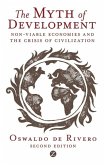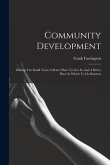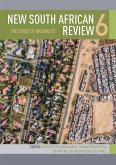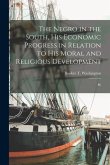Ben Fine
In and Against Development: The World Bank Behind the Looking Glass
Versandkostenfrei innerhalb Deutschlands
30,99 €
inkl. MwSt.
Versandkostenfrei*
Erscheint vorauss. 1. Juli 2026
Melden Sie sich
hier
hier
für den Produktalarm an, um über die Verfügbarkeit des Produkts informiert zu werden.

15 °P sammeln
Ben Fine
In and Against Development: The World Bank Behind the Looking Glass
- Broschiertes Buch
The second of two volumes written “in and against development” meticulously criticizes the World Bank’s scholarship and assesses alternative approaches to development studies. Long self-proclaimed as “Knowledge Bank”, the World Bank is as active as criticized in its endeavors across scholarship, ideology and policy in practice, serving US interests in the age of globalization, neoliberalism and financialization. Its analytical framing draws upon economics imperialism in general, and its evolution through three phases. Corresponding phases of new, newer and newest development economics are…mehr
Andere Kunden interessierten sich auch für
![Interrogating the Future Interrogating the Future]() Interrogating the Future25,99 €
Interrogating the Future25,99 €![The Myth of Development: Non-Viable Economies and the Crisis of Civilization The Myth of Development: Non-Viable Economies and the Crisis of Civilization]() Oswaldo De RiveroThe Myth of Development: Non-Viable Economies and the Crisis of Civilization35,99 €
Oswaldo De RiveroThe Myth of Development: Non-Viable Economies and the Crisis of Civilization35,99 €![Alt-Labor and the New Politics of Workers' Rights Alt-Labor and the New Politics of Workers' Rights]() Daniel J GalvinAlt-Labor and the New Politics of Workers' Rights40,99 €
Daniel J GalvinAlt-Labor and the New Politics of Workers' Rights40,99 €![Community Development: Making The Small Town A Better Place To Live In And A Better Place In Which To Do Business Community Development: Making The Small Town A Better Place To Live In And A Better Place In Which To Do Business]() Frank FarringtonCommunity Development: Making The Small Town A Better Place To Live In And A Better Place In Which To Do Business22,99 €
Frank FarringtonCommunity Development: Making The Small Town A Better Place To Live In And A Better Place In Which To Do Business22,99 €![American Glassware, Old and New: A Sketch of the Glass Industry in the United States American Glassware, Old and New: A Sketch of the Glass Industry in the United States]() Edwin Atlee BarberAmerican Glassware, Old and New: A Sketch of the Glass Industry in the United States18,99 €
Edwin Atlee BarberAmerican Glassware, Old and New: A Sketch of the Glass Industry in the United States18,99 €![New South African Review 6 New South African Review 6]() Devan PillayNew South African Review 635,99 €
Devan PillayNew South African Review 635,99 €![The Negro in the South, His Economic Progress in Relation to His Moral and Religious Development: Be The Negro in the South, His Economic Progress in Relation to His Moral and Religious Development: Be]() Booker T. WashingtonThe Negro in the South, His Economic Progress in Relation to His Moral and Religious Development: Be20,99 €
Booker T. WashingtonThe Negro in the South, His Economic Progress in Relation to His Moral and Religious Development: Be20,99 €-
-
-
The second of two volumes written “in and against development” meticulously criticizes the World Bank’s scholarship and assesses alternative approaches to development studies. Long self-proclaimed as “Knowledge Bank”, the World Bank is as active as criticized in its endeavors across scholarship, ideology and policy in practice, serving US interests in the age of globalization, neoliberalism and financialization. Its analytical framing draws upon economics imperialism in general, and its evolution through three phases. Corresponding phases of new, newer and newest development economics are identified, with the World Bank taking a leading role in each, with implications for the expanding scope of development economics and its contestations with development studies.
Produktdetails
- Produktdetails
- Verlag: Haymarket Books
- Seitenzahl: 366
- Erscheinungstermin: 1. Juli 2026
- Englisch
- ISBN-13: 9798888907900
- Artikelnr.: 75285411
- Herstellerkennzeichnung
- Libri GmbH
- Europaallee 1
- 36244 Bad Hersfeld
- gpsr@libri.de
- Verlag: Haymarket Books
- Seitenzahl: 366
- Erscheinungstermin: 1. Juli 2026
- Englisch
- ISBN-13: 9798888907900
- Artikelnr.: 75285411
- Herstellerkennzeichnung
- Libri GmbH
- Europaallee 1
- 36244 Bad Hersfeld
- gpsr@libri.de
Ben Fine is Emeritus Professor of Economics at SOAS University of and Visiting Professor at Wits School of Governance, University of Witwatersrand, South Africa. His most recent books include Material Cultures of Financialisation, co-edited with Kate Bayliss and Mary Robertson (Routledge, 2018); Race, Class and the Post-Apartheid Democratic State, co-edited with John Reynolds and Robert van Niekerk (University of KwaZulu-Natal Press, 2019); and A Guide to the Systems of Provision Approach: Who Gets What, How and Why, with Kate Bayliss (Palgrave, 2021). His Marx’s ‘Capital’ (Pluto, 2016) is now in its sixth edition (with co-author Alfredo Saad-Filho). He was founding Chair of the International Initiative for Promoting Political Economy (iippe.org) until June 2023.
Contents
Preface vii
1 Locating Development Economics 1
Postamble: Locating the World Bank 14
2 Beyond Bureaucrats in Business: A Critical Review of the World Bank
Approach to Privatisation and Public Sector Reform 23
Postscript as Personal Preamble 23
1 Introduction 28
2 Privatisation Theory: The New Synthesis 29
3 Bureaucrats in Business: Context and Outline 31
4 A Critique 32
4.1 Narrow Analytical Framework 34
4.2 Selective Use of Evidence and Bias in Interpretation 36
4.3 Narrow View of What Constitutes Industrial Policy Leading to
Over-Generalisation of Conclusions 40
5 Concluding Remarks 43
Appendix: Debating the Provision of Basic Utilities in Sub-Saharan
Africa: A Response to Nellis 44
3 The Developmental State Is Dead – Long Live Social Capital? 47
Postscript as Personal Preamble 47
1 Introduction 48
2 The Microeconomic Foundations 50
3 The Forward March of Social Capital 52
4 Neither Washington nor Post-Washington Consensus 59
5 Concluding Remarks 64
4 Flattening Economic Geography: Locating the World Development
Report for 2009 67
Postscript as Personal Preamble 67
1 Introduction 68
2 neg as ei 69
3 From Pre- to Post-Washington Consensus 80
4 Fixing the wdr09 84
5 From Finance to Climate by Way of Conclusion 90
vi Contents
5 Nudging or Fudging: The World Development Report 2015 93
Postscript as Personal Preamble 93
1 Introduction 93
2 wdr 2015 and the Knowledge Bank 95
3 Situating the Turn to Behavioural Economics at the Bank 99
4 The wdr Approach to Behavioural Economics 103
4.1 The wdr’s Mental Model 103
4.2 Behavioural Economics and Development: The Conquest of
Another Frontier? 106
5 From Behavioural Economics to World Bank Policy in Practice:
The Case of hiv- Related Cash Transfers 111
6 Concluding Remarks 115
6 A Paradigm Shift that Never Will Be? Justin Lin’s New Structural
Economics 117
Postscript as Personal Preamble 117
1 Introduction 121
2 From Comparative Advantage to Development: Lin and the nse 125
3 Lin and the Bank 141
4 Conclusion 148
7 Locating the Developmental State and Industrial Policy
after the Crisis 152
Postscript as Personal Preamble 152
Foreword 154
1 Introduction 162
2 Lessons from the Developmental State Paradigm 167
3 Industrial Policy 191
4 South-South Cooperation by Way of Conclusion 209
8 The Continuing Enigmas of Social Policy 223
Postscript as Personal Preamble 223
1 Introduction and Overview 226
2 From Welfare Regimenting … 232
3 … to Convergence through Path Dependence to Crisis 245
4 This Time (Social Policy) Is (and Was) Different(iated) 252
5 Social Policy – It’s Financialisation, Stupid 259
6 Towards Alternatives 272
7 Conclusions as Starting Points 290
References 293
Index 344
Preface vii
1 Locating Development Economics 1
Postamble: Locating the World Bank 14
2 Beyond Bureaucrats in Business: A Critical Review of the World Bank
Approach to Privatisation and Public Sector Reform 23
Postscript as Personal Preamble 23
1 Introduction 28
2 Privatisation Theory: The New Synthesis 29
3 Bureaucrats in Business: Context and Outline 31
4 A Critique 32
4.1 Narrow Analytical Framework 34
4.2 Selective Use of Evidence and Bias in Interpretation 36
4.3 Narrow View of What Constitutes Industrial Policy Leading to
Over-Generalisation of Conclusions 40
5 Concluding Remarks 43
Appendix: Debating the Provision of Basic Utilities in Sub-Saharan
Africa: A Response to Nellis 44
3 The Developmental State Is Dead – Long Live Social Capital? 47
Postscript as Personal Preamble 47
1 Introduction 48
2 The Microeconomic Foundations 50
3 The Forward March of Social Capital 52
4 Neither Washington nor Post-Washington Consensus 59
5 Concluding Remarks 64
4 Flattening Economic Geography: Locating the World Development
Report for 2009 67
Postscript as Personal Preamble 67
1 Introduction 68
2 neg as ei 69
3 From Pre- to Post-Washington Consensus 80
4 Fixing the wdr09 84
5 From Finance to Climate by Way of Conclusion 90
vi Contents
5 Nudging or Fudging: The World Development Report 2015 93
Postscript as Personal Preamble 93
1 Introduction 93
2 wdr 2015 and the Knowledge Bank 95
3 Situating the Turn to Behavioural Economics at the Bank 99
4 The wdr Approach to Behavioural Economics 103
4.1 The wdr’s Mental Model 103
4.2 Behavioural Economics and Development: The Conquest of
Another Frontier? 106
5 From Behavioural Economics to World Bank Policy in Practice:
The Case of hiv- Related Cash Transfers 111
6 Concluding Remarks 115
6 A Paradigm Shift that Never Will Be? Justin Lin’s New Structural
Economics 117
Postscript as Personal Preamble 117
1 Introduction 121
2 From Comparative Advantage to Development: Lin and the nse 125
3 Lin and the Bank 141
4 Conclusion 148
7 Locating the Developmental State and Industrial Policy
after the Crisis 152
Postscript as Personal Preamble 152
Foreword 154
1 Introduction 162
2 Lessons from the Developmental State Paradigm 167
3 Industrial Policy 191
4 South-South Cooperation by Way of Conclusion 209
8 The Continuing Enigmas of Social Policy 223
Postscript as Personal Preamble 223
1 Introduction and Overview 226
2 From Welfare Regimenting … 232
3 … to Convergence through Path Dependence to Crisis 245
4 This Time (Social Policy) Is (and Was) Different(iated) 252
5 Social Policy – It’s Financialisation, Stupid 259
6 Towards Alternatives 272
7 Conclusions as Starting Points 290
References 293
Index 344
Contents
Preface vii
1 Locating Development Economics 1
Postamble: Locating the World Bank 14
2 Beyond Bureaucrats in Business: A Critical Review of the World Bank
Approach to Privatisation and Public Sector Reform 23
Postscript as Personal Preamble 23
1 Introduction 28
2 Privatisation Theory: The New Synthesis 29
3 Bureaucrats in Business: Context and Outline 31
4 A Critique 32
4.1 Narrow Analytical Framework 34
4.2 Selective Use of Evidence and Bias in Interpretation 36
4.3 Narrow View of What Constitutes Industrial Policy Leading to
Over-Generalisation of Conclusions 40
5 Concluding Remarks 43
Appendix: Debating the Provision of Basic Utilities in Sub-Saharan
Africa: A Response to Nellis 44
3 The Developmental State Is Dead – Long Live Social Capital? 47
Postscript as Personal Preamble 47
1 Introduction 48
2 The Microeconomic Foundations 50
3 The Forward March of Social Capital 52
4 Neither Washington nor Post-Washington Consensus 59
5 Concluding Remarks 64
4 Flattening Economic Geography: Locating the World Development
Report for 2009 67
Postscript as Personal Preamble 67
1 Introduction 68
2 neg as ei 69
3 From Pre- to Post-Washington Consensus 80
4 Fixing the wdr09 84
5 From Finance to Climate by Way of Conclusion 90
vi Contents
5 Nudging or Fudging: The World Development Report 2015 93
Postscript as Personal Preamble 93
1 Introduction 93
2 wdr 2015 and the Knowledge Bank 95
3 Situating the Turn to Behavioural Economics at the Bank 99
4 The wdr Approach to Behavioural Economics 103
4.1 The wdr’s Mental Model 103
4.2 Behavioural Economics and Development: The Conquest of
Another Frontier? 106
5 From Behavioural Economics to World Bank Policy in Practice:
The Case of hiv- Related Cash Transfers 111
6 Concluding Remarks 115
6 A Paradigm Shift that Never Will Be? Justin Lin’s New Structural
Economics 117
Postscript as Personal Preamble 117
1 Introduction 121
2 From Comparative Advantage to Development: Lin and the nse 125
3 Lin and the Bank 141
4 Conclusion 148
7 Locating the Developmental State and Industrial Policy
after the Crisis 152
Postscript as Personal Preamble 152
Foreword 154
1 Introduction 162
2 Lessons from the Developmental State Paradigm 167
3 Industrial Policy 191
4 South-South Cooperation by Way of Conclusion 209
8 The Continuing Enigmas of Social Policy 223
Postscript as Personal Preamble 223
1 Introduction and Overview 226
2 From Welfare Regimenting … 232
3 … to Convergence through Path Dependence to Crisis 245
4 This Time (Social Policy) Is (and Was) Different(iated) 252
5 Social Policy – It’s Financialisation, Stupid 259
6 Towards Alternatives 272
7 Conclusions as Starting Points 290
References 293
Index 344
Preface vii
1 Locating Development Economics 1
Postamble: Locating the World Bank 14
2 Beyond Bureaucrats in Business: A Critical Review of the World Bank
Approach to Privatisation and Public Sector Reform 23
Postscript as Personal Preamble 23
1 Introduction 28
2 Privatisation Theory: The New Synthesis 29
3 Bureaucrats in Business: Context and Outline 31
4 A Critique 32
4.1 Narrow Analytical Framework 34
4.2 Selective Use of Evidence and Bias in Interpretation 36
4.3 Narrow View of What Constitutes Industrial Policy Leading to
Over-Generalisation of Conclusions 40
5 Concluding Remarks 43
Appendix: Debating the Provision of Basic Utilities in Sub-Saharan
Africa: A Response to Nellis 44
3 The Developmental State Is Dead – Long Live Social Capital? 47
Postscript as Personal Preamble 47
1 Introduction 48
2 The Microeconomic Foundations 50
3 The Forward March of Social Capital 52
4 Neither Washington nor Post-Washington Consensus 59
5 Concluding Remarks 64
4 Flattening Economic Geography: Locating the World Development
Report for 2009 67
Postscript as Personal Preamble 67
1 Introduction 68
2 neg as ei 69
3 From Pre- to Post-Washington Consensus 80
4 Fixing the wdr09 84
5 From Finance to Climate by Way of Conclusion 90
vi Contents
5 Nudging or Fudging: The World Development Report 2015 93
Postscript as Personal Preamble 93
1 Introduction 93
2 wdr 2015 and the Knowledge Bank 95
3 Situating the Turn to Behavioural Economics at the Bank 99
4 The wdr Approach to Behavioural Economics 103
4.1 The wdr’s Mental Model 103
4.2 Behavioural Economics and Development: The Conquest of
Another Frontier? 106
5 From Behavioural Economics to World Bank Policy in Practice:
The Case of hiv- Related Cash Transfers 111
6 Concluding Remarks 115
6 A Paradigm Shift that Never Will Be? Justin Lin’s New Structural
Economics 117
Postscript as Personal Preamble 117
1 Introduction 121
2 From Comparative Advantage to Development: Lin and the nse 125
3 Lin and the Bank 141
4 Conclusion 148
7 Locating the Developmental State and Industrial Policy
after the Crisis 152
Postscript as Personal Preamble 152
Foreword 154
1 Introduction 162
2 Lessons from the Developmental State Paradigm 167
3 Industrial Policy 191
4 South-South Cooperation by Way of Conclusion 209
8 The Continuing Enigmas of Social Policy 223
Postscript as Personal Preamble 223
1 Introduction and Overview 226
2 From Welfare Regimenting … 232
3 … to Convergence through Path Dependence to Crisis 245
4 This Time (Social Policy) Is (and Was) Different(iated) 252
5 Social Policy – It’s Financialisation, Stupid 259
6 Towards Alternatives 272
7 Conclusions as Starting Points 290
References 293
Index 344







